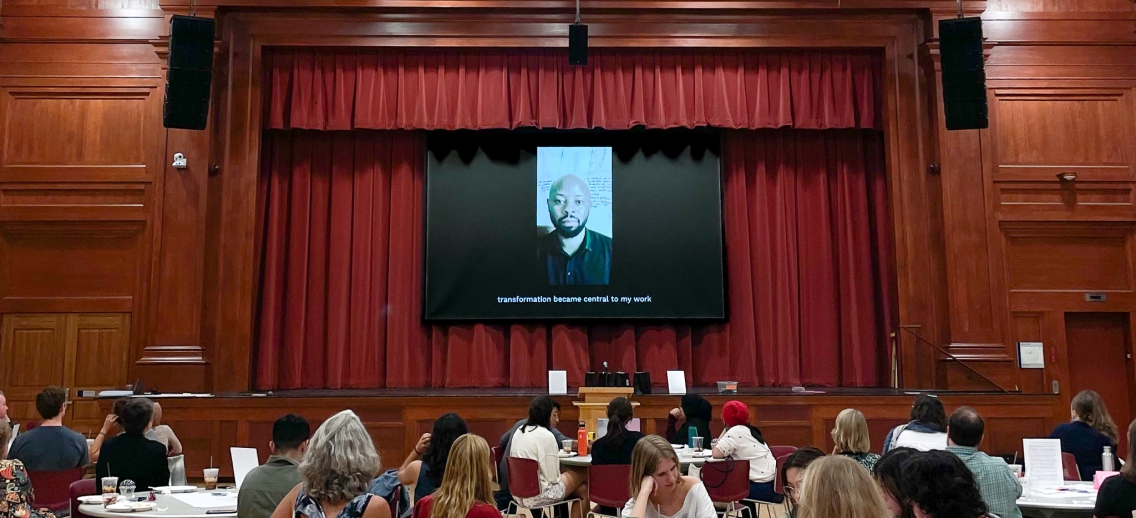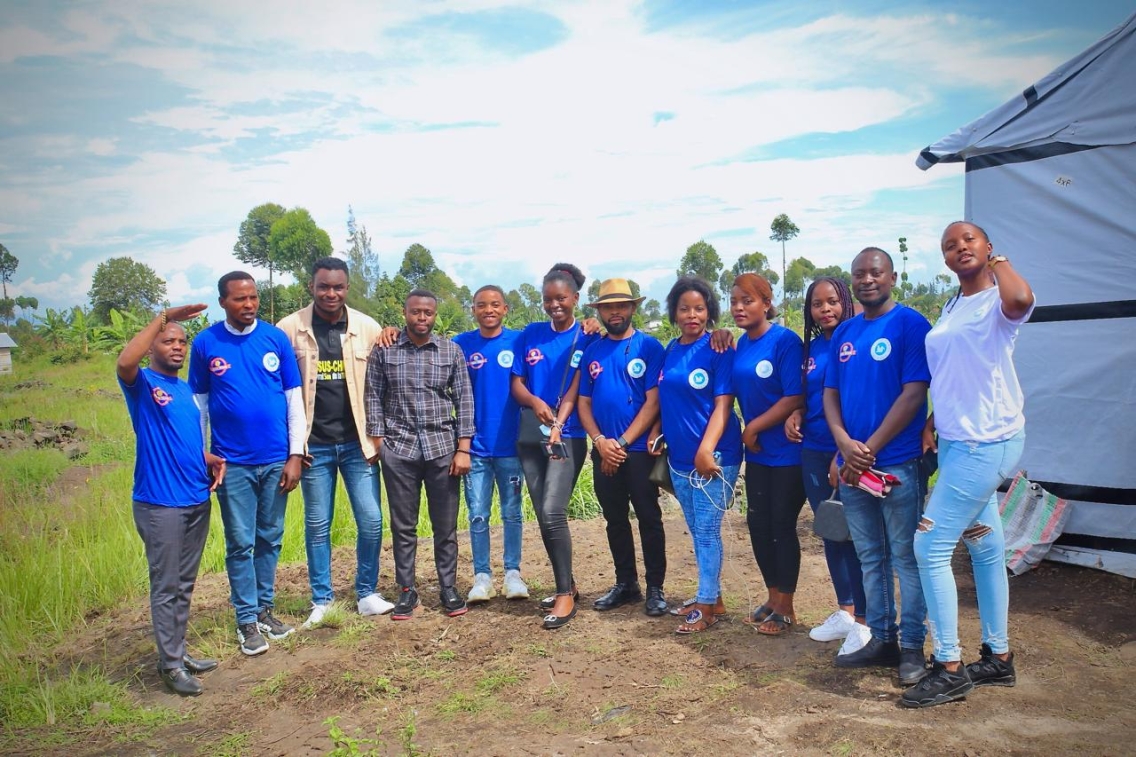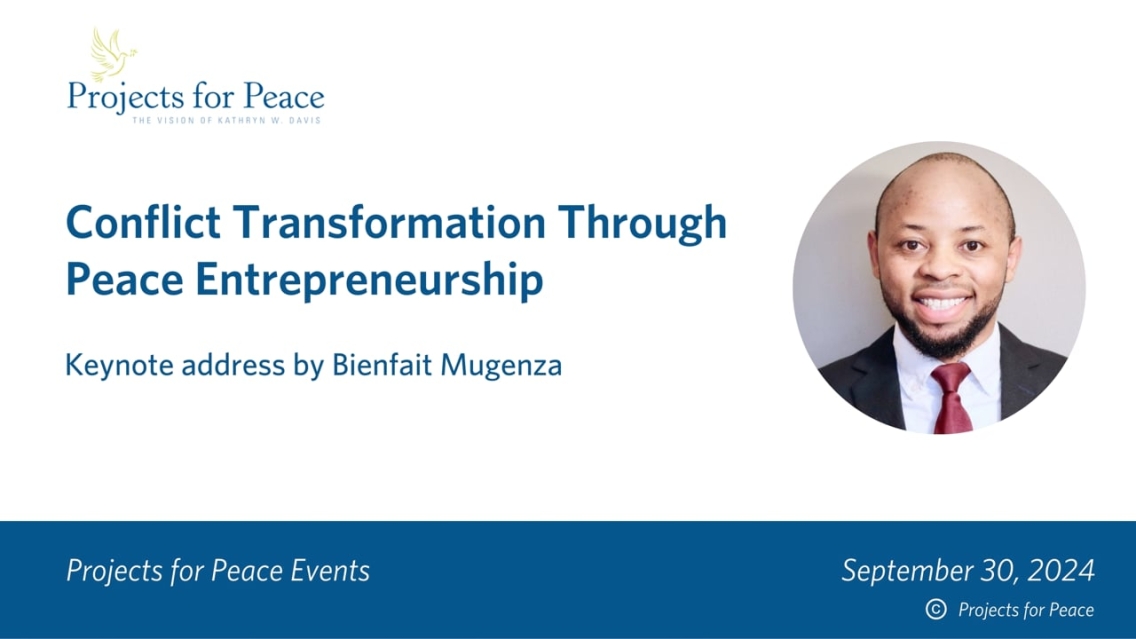Alumni Award Winner Bienfait Mugenza Delivers Keynote on Conflict Transformation through Peace Entrepreneurship
Sustained Impact, Alumni, Partner Institutions, Middlebury, Africa, Agriculture, Education, Technology

This week, Bienfait Mugenza, the 2024 Projects for Peace Alumni Award Winner, delivered a keynote at Middlebury’s Conflict Transformation Experiential Programs Reflection Dinner.
Although Mr. Mugenza couldn’t attend in person, a recording of his keynote was screened, followed by a group discussion.
Undergraduates who participated in summer experiential programs supported by the Middlebury Conflict Transformation Collaborative gathered to share a meal and to reflect on their experiences and their learning. Also present were Projects for Peace participants from Dartmouth College, Mount Holyoke College, and Middlebury.
A 2021 University of Rochester graduate and 2018 Projects for Peace grantee, Mr. Mugenza founded the Congo Peace Academy to strengthen community resilience in the Democratic Republic of Congo. He received the 2024 Alumni Award for his vision of youth empowerment through “peace entrepreneurship,” which for him is necessarily holistic.

The Congo Peace Academy offers programs in youth leadership, entrepreneurship, sustainable agriculture, arts for social change, and a new “tech for peace” initiative, all while promoting nonviolent communication, inter-ethnic dialogue, and collaborative conflict resolution.
In his keynote, Mr. Mugenza remarked that “conflict transformation is more than resolving specific problems; it’s about building healthier relationships and more resilient communities—not just in Congo, but globally.” After the keynote, students engaged in lively discussion about how these ideas applied to their summer projects.
You can watch the full recording of Mr. Mugenza’s keynote below or read the full transcript further down the page. For more about Mr. Mugenza, visit his website here.
Full Keynote Address Transcript:
Esteemed colleagues, professors, researchers, students, and peace activists from around the world, good afternoon!
It is a true honor to stand before you today, having been awarded the Projects for Peace Alumni Award by Projects for Peace and the Kathryn Wasserman Davis Collaborative in Conflict Transformation at Middlebury for my work with Congo Peace Academy, an organization I founded to promote peace through entrepreneurial initiatives. I come to you not only as the CEO of this academy but as someone who has lived and worked within the heart of conflict. My story is one of conflict transformation, of seeing conflict not just as a force to be managed but as a catalyst for real, meaningful change.
Who am I in conflict?
Conflict is a reality in all human relationships, and in the Democratic Republic of Congo, it has shaped our collective and individual experiences. I am no stranger to conflict. Growing up in a region marked by violence and instability, I have witnessed its destructive power firsthand. But I have also come to understand that conflict, though painful, is not inherently negative—it is, in fact, a motor of change.
Who am I in the face of conflict? I am a Congolese leader who chose to engage, not avoid. In my journey, I learned that conflict transformation is more than the mere resolution of specific problems. It is about engaging in constructive efforts that include, and go beyond, temporary solutions. It requires us to focus on building healthier relationships and more resilient communities—not just in Congo, but globally.
This understanding of conflict transformation became central to my work. I did not just want to solve problems; I wanted to create lasting structures where conflict could be an opportunity for growth, understanding, and positive change. This shift in mindset—seeing conflict as a source of potential—has profoundly shaped who I am today.
How did I come to be that?
Like many young people from conflict zones, I faced difficult choices. I could either remain a passive observer or become an active participant in shaping my community’s future. My academic journey at the University of Rochester provided me with the tools to better understand the dynamics of conflict and peacebuilding, helping me see the structural injustices that fuel violence. But more importantly, it gave me the conviction that peace is not simply the absence of conflict but the presence of opportunity, equity, and hope.
One of the most transformative moments in my journey was launching the Peace Through Entrepreneurship project. This initiative, was designed to equip young people in Goma with leadership and entrepreneurial skills. Through this program, I saw firsthand the incredible power of economic empowerment in preventing young people from turning to violence. When we provide individuals with the skills and resources to create their own futures, we also provide them with the tools to break free from cycles of poverty and conflict.
Entrepreneurship became my method of peacebuilding. It was not just about teaching young people how to start businesses—it was about giving them agency, purpose, and a stake in their community’s future. Congo Peace Academy was born out of this philosophy, with the mission to empower our youth, to give them the civic and leadership skills necessary for lasting peace and development.
What has this meant for my continued work in peace entrepreneurship?
Conflict transformation, as I see it, is not just about resolving issues but about changing the way we relate to one another, both locally and globally. It requires a shift in our ways of thinking, our ways of engaging, and our ways of building community. At Congo Peace Academy, we focus on creating that shift—on fostering relationships built on trust, mutual understanding, and shared goals.
This approach requires real, systemic change. It means teaching young people that they are not defined by the conflicts they are born into but by how they choose to engage with them. In our academy, we don’t just train students in entrepreneurship or leadership; we train them in the art of transformation. We teach them that true leadership is not about power over others, but power with others. It’s about working together to build systems that promote justice, equity, and peace.
We cannot forget that peace is a journey. Conflict transformation provides a clear and important vision because it brings into focus the horizon toward which we are all journeying: the building of healthy, thriving communities. But this goal requires us to fundamentally change how we relate to one another. Peacebuilding, therefore, becomes an act of entrepreneurship—creating new opportunities, new structures, and new relationships that move us closer to that shared horizon.
My commitment to act…
So, who am I in conflict? I am someone who chose not to see conflict as the end of something but as the beginning of something new. I am a peace entrepreneur—someone who believes that every conflict, no matter how devastating, carries within it the seeds of transformation. I came to this realization through my experiences in Congo, through my education abroad, and through the incredible support of mentors and communities that believed in my vision for peace.
My continued work is guided by this belief that transformation is possible. That no matter how entrenched the conflict, no matter how high the barriers, we can build healthier, more peaceful communities—if we engage in the process of change with vision, courage, and compassion.
Today, I stand before you as a testament to the power of transformation. And I invite each of you, whether you are students, researchers, professors, or peace activists, to see conflict not as something to fear, but as an opportunity to act. To lead. To transform.
Thank you for your time!


